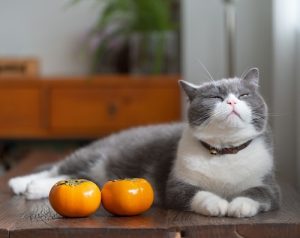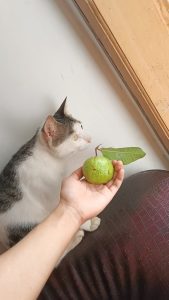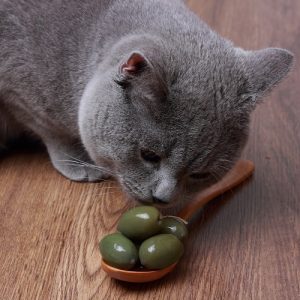Can Cats Eat Pomegranate? Find out if this juicy fruit is safe and healthy for your kitty in our insightful article.
You’ve just finished enjoying a juicy pomegranate, and your curious feline friend seems eager to join in on the fruity delight. But before you treat your whiskered companion to a taste of this exotic fruit, it’s essential to consider—Can Cats Eat Pomegranate? Or Are Pomegranates Toxic to Cats? Let’s dive into the world of feline nutrition and learn what makes this fruit a friend or foe to our furry friend.
Can Cats Eat Mango? Find out here
What Is Pomegranate?

Pomegranate is a shrub or small tree that is native to the Mediterranean region. Now, it is widely cultivated in many parts of the world for its edible fruit, which is typically round and about the size of an apple.
The pomegranate fruit is known for its distinctive appearance, with a tough, leathery outer rind that encases hundreds of small, juicy seeds called arils. The arils are the edible part of the fruit; they have a tart, sweet flavor and a crunchy texture.
Pomegranates are rich in antioxidants, vitamins, minerals, and have been associated with a range of health benefits, such as improving heart health, reducing inflammation, and promoting digestion. Its juice and extracts are also available as dietary supplements.
Can Cats Eat Pomegranate?
Yes, technically, cats can eat pomegranate. However, being obligate carnivores, cats primarily require animal-based proteins in their diet to thrive. While pomegranates are a rich source of antioxidants, vitamins, and minerals for humans, they are not an essential part of a cat’s diet. If you want to serve your feline with a juicy treat, you must do that in moderation and in a small amount.
In fact, feeding your cat pomegranate can lead to potential health concerns, leading to symptoms such as vomiting, diarrhea, or abdominal discomfort. Additionally, the seeds in pomegranates can pose a choking hazard or cause an intestinal blockage, particularly in smaller cats. Given these potential health risks and the lack of nutritional benefits for cats, it is best to avoid feeding your feline friend pomegranate.
Are Pomegranates Toxic to Cats?
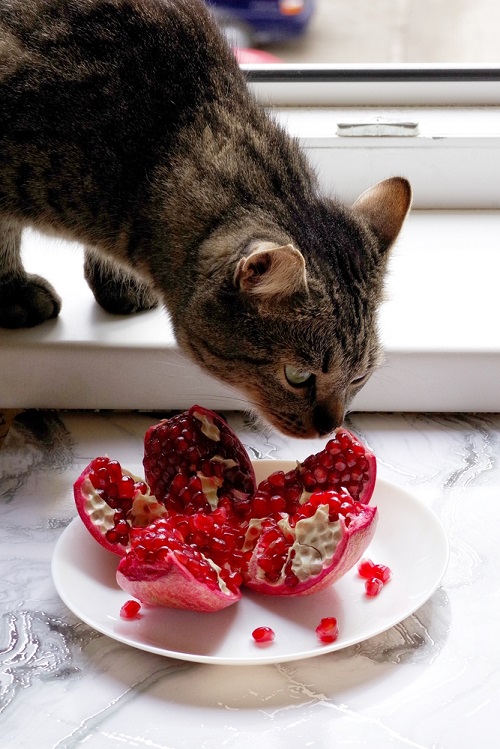
Although pomegranates are not classified as toxic to cats, they can cause digestive issues when ingested by our feline friends. This is primarily because cats have a carnivorous digestive system designed to process animal proteins, and their ability to break down plant-based foods is limited.
Pomegranate seeds and the fruit’s arils contain high levels of tannins, which can cause gastrointestinal upset in cats, primarily stomach irritation, vomiting, and diarrhea. Furthermore, the fruit’s fibrous texture can also be challenging for cats to digest, potentially causing additional gastrointestinal problems.
Always consult with a veterinarian before introducing new food to ensure it is safe and appropriate for your cat’s specific nutritional needs.
Does Pomegranate Contain Any Nutritional Value For Cats?
Pomegranate does contain some nutritional value for cats, as it is rich in antioxidants, vitamins, and minerals. However, the risk of gastrointestinal problems outweighs the minimal nutritional benefit.
Risks Of Feeding Pomegranate To Cats
- Cats may experience diarrhea or vomiting if they consume excessive amounts of pomegranate.
- The tough outer rind and seeds of the pomegranate can pose a choking hazard to cats if they attempt to eat them.
- The seeds can get lodged in the throat or digestive tract, causing serious health problems.
- Some cats may be allergic to pomegranate or its components, which could cause an allergic reaction.
- Signs of an allergic reaction include itching, swelling, and difficulty breathing.
- Pomegranate may interact with certain medications that cats are taking, such as blood thinners. This can cause health problems.
Can Cats Drink Pomegranate Juice?
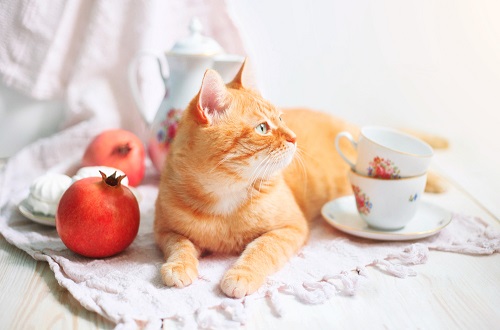
While cats can technically drink pomegranate juice, it is not recommended as a regular part of their diet. Pomegranate juice is high in natural sugars and may contain added sugars, which can cause digestive upset, including diarrhea or vomiting if consumed in excess. Therefore, it is best to avoid feeding cats pomegranate juice or any other fruit juice and instead provide them with fresh, clean water to drink.
Other Fruits And Foods That Cats Should Avoid
- Onions and Garlic – Both of these food items contain compounds that can cause anemia in cats if consumed in large amounts.
- Grapes and Raisins – This fruit can cause kidney damage in some cats.
- Avocado – The flesh and skin of avocados contain a compound called persin, which can be toxic to cats.
- Chocolate – Chocolate contains theobromine, which can be toxic to cats.
- Dairy Products – Many cats are lactose intolerant, and consuming dairy products can cause digestive upset.
- Alcohol – Even small amounts of alcohol can be toxic to cats and cause respiratory failure.
- Bones – Cooked bones can splinter and cause serious internal injuries or blockages in cats.
- Caffeine – Found in coffee, tea, and some sodas, caffeine can cause restlessness, heart palpitations, and muscle tremors in cats.
Options Other Than Pomegranate
If you are looking for other fruits or foods to supplement your cat’s diet, here are some options:
- Protein-rich foods: Chicken, turkey, beef, lamb, and fish are good sources of protein for cats.
- Cooked vegetables: While cats do not require vegetables in their diet, some cats enjoy them and can benefit from their nutrients. Good options include mashed potatoes, sweet potatoes, cabbage, and kale.
- Blueberries: Blueberries are safe for cats and are a good source of antioxidants.
- Bananas: Bananas are safe for cats in small amounts and can provide some nutritional benefits, such as potassium and fiber.
- Watermelon: Cats can eat watermelon in small amounts, and it is a good source of hydration.
Can Cats Eat Pomegranate? Quick Takeaways!
- Cats can eat pomegranates, but it is not recommended as they require a protein-rich diet.
- Feeding cats too much pomegranate or its juice could lead to health problems.
- Pomegranates are not fatal to cats but may pose a choking hazard, cause allergic reactions, or interact with certain medications.
- It is best to avoid feeding cats pomegranate juice or any other fruit juice.
- Cats should avoid consuming onions, garlic, grapes, raisins, avocado, chocolate, dairy products, alcohol, bones, and caffeine, as these can cause various health problems.
- Pomegranate alternatives include protein-rich food, cooked vegetables, blueberries, bananas, and watermelon.

